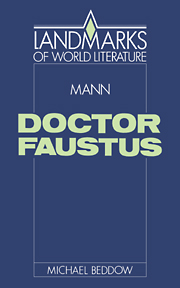2 - An artist's life
Published online by Cambridge University Press: 05 June 2012
Summary
The magic square
As in so many of Thomas Mann's fictions, an apparently simple narrative surface hides virtually inexhaustible layers of complexity. Serenus Zeitblom, a schoolmaster in his sixties living in provincial Bavaria, who gave up his job after Hitler's seizure of power, writes the biography of Adrian Leverkühn, a composer known to him since childhood who has died two years previously after a decade of insanity. What we read is not so much a finished biography as a draft incorporating Zeitblom's many and various reflections about the circumstances and ostensible defects of his writing. Indeed, for all his hyper-literary style, Zeitblom seems to imagine himself addressing a potentially fractious audience, rather than writing for a future readership: one does not, after all, ask such a readership's permission to start a rambling sentence again, as Zeitblom does in his very first paragraph (p. 9, LP 1), the first of a series of such apologetic self-corrections. Zeitblom begins writing in May 1943, after Stalingrad and German reverses in North Africa have made it clear that the tide of war has turned against Hitler: he brings his story to an end shortly after the German capitulation two years later, when most of Germany's cities are in ruins. (The actual composition of the novel took Thomas Mann rather longer: his real starting date coincided with the fictional one, but the novel was not completed until January 1947.)
- Type
- Chapter
- Information
- Mann: Doctor Faustus , pp. 15 - 66Publisher: Cambridge University PressPrint publication year: 1994

